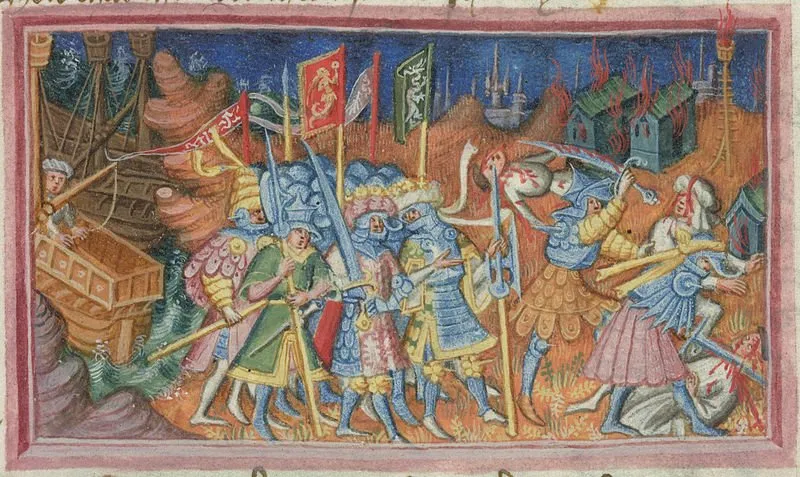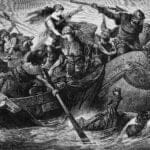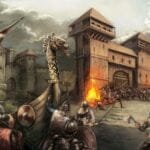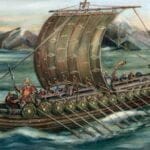Prepare for a history adventure! We’re taking a trip back to the 9th century, a time when Vikings sailed the seas, knowledge flourished in the Muslim world, and empires rose and fell across the globe. Get ready to explore the events, culture, and lasting impact of this fascinating period.
When Was the 9th Century?
The 9th century, spanning from 801 to 900 AD, was a period of significant transformation across the world. From cultural revolutions and political upheavals to religious shifts and groundbreaking discoveries, the 9th century laid the foundation for the world we know today.
Imagine Europe buzzing with new ideas during the Carolingian Renaissance while fearless Vikings redrew the maps of Britain and Ireland with their daring raids. Meanwhile, in Southeast Asia, the powerful Khmer empire began its rise to prominence.
Here’s a glimpse into some defining features of the 9th century:
- The House of Wisdom: In Baghdad, the “House of Wisdom” became a melting pot of brilliant minds. This intellectual powerhouse fostered significant advancements in mathematics, including the development of algebra by al-Khwarizmi and quadratic equations by the Indian mathematician Śrīdharācārya.
- Political Shifts in Southeast Asia: Southeast Asia witnessed dynamic power struggles and the rise of new kingdoms. The Mataram Kingdom in Java reached its zenith, while the Pagan kingdom emerged in Burma. Meanwhile, in Central America, the Maya civilization experienced a major political collapse, the effects of which would resonate for centuries.
- The Viking Age: The Vikings, skilled seafarers and warriors from Scandinavia, left an indelible mark on history. Their raids on Britain and Ireland led to the conquest of Anglo-Saxon kingdoms and forever intertwined their culture with the fabric of these islands.
- Igbo Bronze Casting: In West Africa, the Igbo people honed their exceptional metalworking skills, creating intricate bronze sculptures imbued with deep religious and ceremonial significance. These sculptures offer valuable insights into their beliefs, rulers, and everyday lives.
Beyond these highlights, the 9th century witnessed a wealth of pivotal events:
- Translation Movement: Al-Ma’mun, the Abbasid caliph, spearheaded a massive translation movement. Greek and Indian scientific texts were translated into Arabic, spreading knowledge throughout the Islamic world and beyond.
- Byzantine Struggles: The Byzantine Empire, a dominant force in the East, faced relentless challenges from the Abbasid Caliphate and the Bulgarian Empire. This ongoing struggle for power shaped the political landscape of the region.
- Tang Dynasty in China: Emperor Xianzong of the Tang Dynasty implemented reforms to strengthen his rule, but subsequent rebellions weakened the dynasty’s grip on power, foreshadowing its eventual decline.
- Khmer Expansion: The Khmer empire, centered in present-day Cambodia, expanded its influence across much of Southeast Asia, leaving a lasting legacy of architectural wonders and cultural achievements.
The 9th century was a melting pot of cultural exchange, intellectual exploration, and political upheaval, setting the stage for the centuries that followed. From groundbreaking discoveries to major power shifts, this era continues to fascinate historians and ignite the imaginations of history enthusiasts worldwide.
What Defined the 9th Century?
The 9th century was a period of dramatic transformation and unprecedented achievements that left an indelible mark on the course of human history. Empires rose and fell, knowledge transcended borders, and cultures clashed and blended, shaping the world we know today.
The Golden Age of Islamic Scholarship
In the East, the Abbasid Caliphate, with Baghdad at its heart, experienced a golden age of intellectual and cultural flourishing. The House of Wisdom, a renowned center of learning, attracted scholars from far and wide, fostering groundbreaking discoveries in mathematics, astronomy, medicine, and philosophy. It was here that al-Khwarizmi laid the foundations of algebra, a testament to the era’s intellectual prowess.
Meanwhile, the Tang Dynasty in China ushered in an era of peace and prosperity. Emperor Xianzong, known for his effective governance, fostered artistic endeavors and technological advancements.
Viking Expansion and Its Impact
Across Europe, the Vikings, skilled navigators and fierce warriors from Scandinavia, embarked on daring voyages that would reshape the political landscape. Their longships sailed across the seas, raiding coastal settlements and establishing new trade routes. Their impact on Europe was profound, leading to the decline of the Carolingian Empire and the emergence of new kingdoms. The Vikings’ voyages extended beyond Europe, reaching North America centuries before Columbus.
Artistic Innovation and Cultural Fusion
In West Africa, the Igbo people showcased their exceptional craftsmanship through intricate bronze sculptures. These sculptures, far from mere decorative objects, served as powerful representations of their religious beliefs and cultural practices, offering valuable insights into their worldview.
Southeast Asia witnessed the rise of powerful kingdoms, including the Mataram Kingdom in Java, known for its impressive temples and powerful rulers, and the Pagan kingdom in Burma, which fostered a unique blend of Buddhism and indigenous traditions.
A Century of Transformation
The 9th century stands as a testament to the interconnectedness of civilizations and the transformative power of cultural exchange. From the flourishing of knowledge in Baghdad to the Viking voyages that reshaped Europe, from the artistic brilliance of the Igbo people to the rise of powerful kingdoms in Southeast Asia, the 9th century witnessed a confluence of events that continue to shape our world today.
The World in 801: Setting the Stage
The year 801 AD marked a pivotal moment in history, setting in motion a century of profound change and transformation. Europe stood at a crossroads, with the nascent Carolingian Empire under Charlemagne vying for power while Viking raids began to reshape the continent’s destiny.
Charlemagne, a ruler of immense ambition, had united much of Western Europe under his banner. His reign ushered in an era of stability and cultural revival known as the Carolingian Renaissance. The arts, literature, and learning flourished under his patronage.
Meanwhile, from the north, a new force emerged: the Vikings. These skilled seafarers and fierce warriors embarked on daring raids that instilled fear and awe throughout Europe. Their longships, capable of navigating both rivers and seas, allowed them to strike swiftly and unexpectedly, leaving a lasting impact on the political and cultural landscape.
The House of Wisdom in Baghdad, a beacon of knowledge, thrived as scholars from across the Islamic world converged to share ideas and make groundbreaking discoveries. This intellectual hub fostered advancements in mathematics, astronomy, medicine, and philosophy, laying the foundation for centuries of intellectual progress.
Beyond Europe, the world witnessed significant shifts. China, under the Tang Dynasty, experienced dynastic struggles and social transformations that would shape its future. Japan grappled with its own internal challenges as it sought to forge a new identity. Even the seas were tumultuous as Norman pirates emerged, wreaking havoc with their daring raids.
Amidst this backdrop of change and uncertainty, a beacon of hope shone in England. King Alfred the Great, renowned for his courage and leadership, rallied his people against Viking incursions, laying the foundation for a unified and powerful England.
The year 801 marked not only the dawn of a new century but also the beginning of an era defined by remarkable individuals, transformative events, and the enduring power of the human spirit.
Major Events and Developments of the 9th Century
The 9th century witnessed a whirlwind of events that reshaped the world, from the rise of empires and the spread of new ideas to the clash of cultures and the enduring legacy of human ingenuity.
Charlemagne and the Carolingian Renaissance
In Europe, the coronation of Charlemagne as Emperor of the Romans in 800 AD marked a turning point in history. This momentous event breathed new life into the idea of a unified Western Roman Empire, which had crumbled centuries earlier. Charlemagne’s reign ushered in a period of relative stability, cultural revival, and intellectual curiosity known as the Carolingian Renaissance. This resurgence of learning laid the groundwork for the development of future European powers, including France and Germany.
The Viking Age
While Charlemagne sought to unify Europe, a new force emerged from the north: the Vikings. These skilled seafarers and warriors, hailing from Scandinavia, embarked on daring raids that spread fear and awe throughout Europe. Their longships, fast and maneuverable, allowed them to strike coastal settlements with devastating speed. Viking raids, while initially disruptive, led to the emergence of new trade routes, the establishment of Viking settlements, and the blending of Scandinavian culture with those of the regions they explored.
The Golden Age of Islamic Scholarship
The Islamic world experienced a golden age of intellectual and cultural flourishing during the 9th century. The House of Wisdom in Baghdad, a renowned center of learning, attracted scholars from diverse backgrounds, fostering groundbreaking discoveries in mathematics, astronomy, medicine, philosophy, and more. Al-Khwarizmi, a brilliant scholar of the House of Wisdom, developed algebra, a testament to the era’s intellectual achievements.
The Spread of Christianity and the Growth of the Islamic Empire
Christianity continued its spread throughout Europe, fueled by dedicated missionaries who ventured into new territories to share their faith. Figures like Ansgar, Cyril, and Methodius played pivotal roles in converting populations and establishing a lasting Christian presence in new regions.
Meanwhile, the Islamic empire, under the Abbasid Caliphate, continued its expansion, encompassing a vast territory stretching from North Africa to Central Asia. This expansion brought together diverse cultures and facilitated the exchange of knowledge, shaping the cultural and intellectual landscape of the medieval world.
A Century of Change and Innovation
The 9th century was a time of profound change, marked by both challenges and opportunities. From the Viking raids that reshaped Europe to the intellectual achievements of the Islamic Golden Age, from the spread of Christianity to the rise and fall of empires, the events of this era laid the foundation for the world we know today. The 9th century reminds us that history is not a linear progression but rather a tapestry woven from threads of innovation, conflict, and cultural exchange.
Do you want to know more about the ninth century? Visit our page on who invented ireland during the ninth century and regional states in ninth-and tenth-century mesoamerica.
- Unlock Filipino Culture: A Deep Dive into Traditions and Practices - April 23, 2025
- Unlock Spanish Culture: Insights & Opportunities Now - April 23, 2025
- White Spirit Uses & Substitutes: A Deep Dive for Pros & DIYers - April 23, 2025

















Comments are closed.